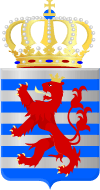Languages of Luxembourg
The linguistic situation in Luxembourg is characterized by the practice and the recognition of three official languages: French, German, and the national language Luxembourgish, established in law in 1984. These three languages are also referred to as the three administrative languages.
| Languages of Luxembourg | |
|---|---|
| Official | Luxembourgish, French, German |
| Foreign | English, Portuguese, Italian |
| Source | [1] |
Upon the founding of the country, French enjoyed the greatest prestige, and therefore gained preferential use as the official and administrative language. German was used in the political field to comment on the laws and the ordinances in order to make them comprehensible to everyone. At the primary-school level, teaching was limited to German, while French was taught in secondary education. The law of 26 July 1843, reinforced bilingualism by introducing the teaching of French in primary school.
Constitutional revision
Until 1984, the official use of the languages was based on the grand-ducal decrees of 1830, 1832 and 1834, which allowed the free choice between German and French. French was preferred in the administration. Luxembourgish had no official status at all.
The constitutional revision of 1984 gave the legislature the power to regulate the language by law. On February 24, 1984, a law, passed by the constitutional chamber, made Luxemburgish the national language. Furthermore, this law recognizes the three languages of Luxembourg (Luxembourgish, French and German) as administrative languages. French remains the language of legislation, due to the application of the Napoleonic civil code in Luxembourg.
Participation in German and French language councils
Despite having German as one of its official languages, Luxembourg, which was not involved in devising the German orthography reform of 1996, is merely a non-voting observer in the Rat für deutsche Rechtschreibung (Council for German Orthography). The government of Luxembourg unilaterally adopted the reform and, due to its efficiency, it is well-accepted by the country's teachers. According to the duchy's largest newspaper, the Luxemburger Wort, Luxembourg does not perceive itself as a "German-speaking country" (the only national language is Luxembourgish) and thus had no right to take part in the council.[2] Despite this, Luxembourg takes part in the annual meetings of German-speaking countries.[3]
Luxembourg does however participate in the Francophonie and has members in the Académie française, despite French also only being an official language.[4] This might be due to the fact that Francophonie as an organization seeks to promote the use of the French language around the world, rather than regulate it, and thus includes many members that are not French-speaking, such as Romania and Greece.[5]
Education
Luxembourgish is taught at pre-primary level, in schools after French and German. When Luxembourgish children are first taught to read and write, it is in German.[6] The language of instruction in primary school is German. Moreover, Luxembourgish is taught only one hour per week at secondary school and only in the first years. In some secondary schools, the language of instruction changes to French. In secondary school, besides German, French and Luxembourgish, English and Latin, Spanish or Italian are taught. At the university level, multilingualism makes it possible for Luxembourgish students to continue their higher education in French, German or English-speaking countries.
Press, police, public services
German and French are the primary languages for public service information. German is the main language of the written press and for recording police case files.[7]
Other languages
Foreign-born persons and guest workers make up more than a third (47%) of the population of Luxembourg. The most common languages spoken by them, other than German and French, are Portuguese, Italian, and English.[8]
In addition to Luxembourgish, French, and German; English is frequently an acceptable language for use in and with government services.[9]
Statistics
The following tables list the percentage of inhabitants who are able to speak a language natively or as a second language.
| 2012[10] | Luxembourgish | French | German | English | other |
|---|---|---|---|---|---|
| Native language | 52% | 16% | 2% | N/A | 30% |
| Second language | N/A | 80% | 69% | 56% | N/A |
| Combined | N/A | 96% | 71% | N/A | N/A |
| 2005[11] | Luxembourgish | French | German | English | other |
|---|---|---|---|---|---|
| Native language | 77% | 6% | 4% | 1% | 12% |
| Second language | 13% | 90% | 88% | 60% | N/A |
| Combined | 90% | 96% | 92% | 61% | N/A |
See also
References
- "SPECIAL EUROBAROMETER 386 Europeans and their Languages" (PDF). ec.europa.eu. Archived from the original (PDF) on 2016-01-06.
- Luxemburger Wort, 9 August 2004
- https://brf.be/regional/1117620/ BTF.be - 14. Treffen deutschsprachiger Länder in Luxemburg (27.9.2017)
- "Archived copy". Archived from the original on April 16, 2009. Retrieved May 2, 2009.CS1 maint: archived copy as title (link)
- "77 États et gouvernements" (in French). Organisation internationale de la Francophonie. Archived from the original on 30 September 2013. Retrieved 28 December 2013.
- http://www.luxembourg.public.lu/en/le-grand-duche-se-presente/langues/utilisation-langues/ecole/index.html
- http://www.luxembourg.public.lu/en/le-grand-duche-se-presente/langues/utilisation-langues/index.html
- "Recensement De La Population 2011" (PDF). Statistiques.public.lu. Retrieved 2016-04-21.
- https://guichet.public.lu/en.html
- "Special Eurobarometer 386" (PDF). Ec.europa.eu. Archived from the original (PDF) on 2016-01-06. Retrieved 2016-04-21.
- "Europeans and their Languages" (PDF). Eurobarometer. Retrieved 2016-04-21.
